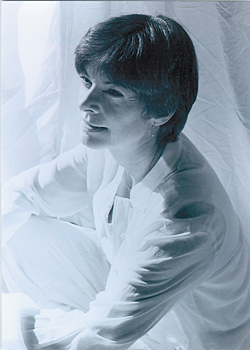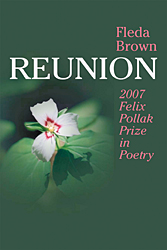That's the story behind Reunion, Brown's sixth book of poetry published in March by the University of Wisconsin Press, as a result of Brown's winning the 2007 Felix Pollak Prize in Poetry.
The title was inspired by Brown's step back in time to attend her 40th high school reunion. The book honors the three most important places in her life-Arkansas, where she grew up; Michigan, where she spends her summers; and Delaware, where she has built her adult life. There are poems about flowers, about learning to tie knots, about family and friends and strangers whose stories have touched her heart. There are poems about stages of life as diverse as junior high and hot flashes. All of them, she said, are “people poems, poems with stories to tell.”
The poem, ”Fayetteville Junior High,” for example, reminds us all of the first time we realized teachers have real lives. She writes,
When we weren't looking,
Mr. Selby married Miss Lewis.
We tried to think of it, tip-
toed Mr. Selby, twirling
the edges of blackboard numbers
like the sweet-pea tendrils
of his hair, all his calculations
secretly yearning away
from algebra, toward Miss Lewis,
legs like stone pillars in the slick
cave of the locker room,
checking off the showered,
the breasted, flat-chested.All this: another world
we never dreamed of inside
the bells, the changing
of classes: Selby and Lewis,
emerging from rooms 4 and 16,
holding hands like prisoners
seeing the sky after all those
years. “Bertha,” he says. “Travis,”
she says. The drawbridge
of the hypotenuse opens,
the free-throw line slides
forward, worn floor creaking.
In homeroom, the smell
of humans, rank, sprouting,
yet this hope for us all.
The poems about Michigan are inspired by the family cottage Brown's grandfather built in 1918. “Summer places are a kind of Nirvana-the places that live in the imagination, that seem better than anywhere else,” Brown explained. One poem, “Ode to the Buffman Brothers,” talks about the construction team excavating for a new kitchen at that cottage. Another talks about herons, but is really about writing and about poetry. It reads in part:
Herons are bigger than egrets, though they have the same long legs.
My father said one with an eight-foot wingspan flew over this boat.
I would like to be shadowed by something that big. It would seemlike poetry, just out of reach, moving and making a bare flush
of wings , and I would think of it long after, the way it was heading
away from me. My longing would not be satisfied even if I couldgrab its scrawny legs in my hand, even it if nuzzled up to me?
There are fewer poems about Delaware but, as Brown explains, “Delaware has tended to be the place where I work, so I've had less time to romanticize it.” One, about the Indian River Inlet in March reads in part,
March: nothing here but a blank tinkertoy city of docks,
and unlocks the depths. I remember to think how weird
and one revved-up loon piercing the watery center
with its sharp ancient beak. All alone it locks
for a bird to fly through water. Meanwhile, little pings,
mooring rings nudging shoulders with the pilings,and I'm shifting foot-to-foot on the balcony, waiting
for the loon to show, wondering why it divides itself, how
it knows how. I wonder if it's mocking me.
Although she is planning for retirement and on sabbatical this year, Brown is working as hard as ever. She is teaching in a low residency MFA program in Tacoma, Wash., where she is on campus just 10 days each summer and communicates with students via e-mail the rest of the time. “It's just the right amount of continuing what I have been doing,” she said.
And, as Delaware's poet laureate, she has plenty of readings on her calendar and is helping with several programs--like the Writers at the Beach workshop and the Milton Poetry Festival--aimed at encouraging writers throughout the state. She also helps with Delaware's participation in “Poetry Out Loud,” a national recitation contest and keeps in touch with other poets in the state.“Poets pretty much work on their own. You hope people will offer you readings and that if people hear you read they will buy your books, but the poetry-buying public is fairly small. We try to do all we can to make people more aware of poetry,” she said.
One of the poems in the book is “Reading Poetry at the Horse Meadow Senior Center,” an experience that led Brown to develop one of her writing credos. “I read there with another poet, Sydney Lea, and we both agreed that we always want our poems to be on one level, accessible. We said we would never want to write poems that the people at Horse Meadow would not understand. You do not have to be obscure to write a poem that's good. That's something young poets sometimes don't understand.”
While Brown says writing poetry “at its root is a kind of play, it's also,” she said, “a lot of hard work.”
“I throw away a lot more than I keep--all the sort of B-level poems that every poet throws out.”
A poem is finished, she said, “when it has a certain energy and authenticity, when it doesn't feel strained; when it feels rich and deep and kind of surprising.”
Copies of Reunion are available in hard cover and paperback from the University of Wisconsin Press at [www.wisc.edu/wisconsinpress/]. For more information on Brown, her writing and her work as poet laureate, visit her web site at [www.fledabrown.com/fleda/].
Article by Beth Thomas




